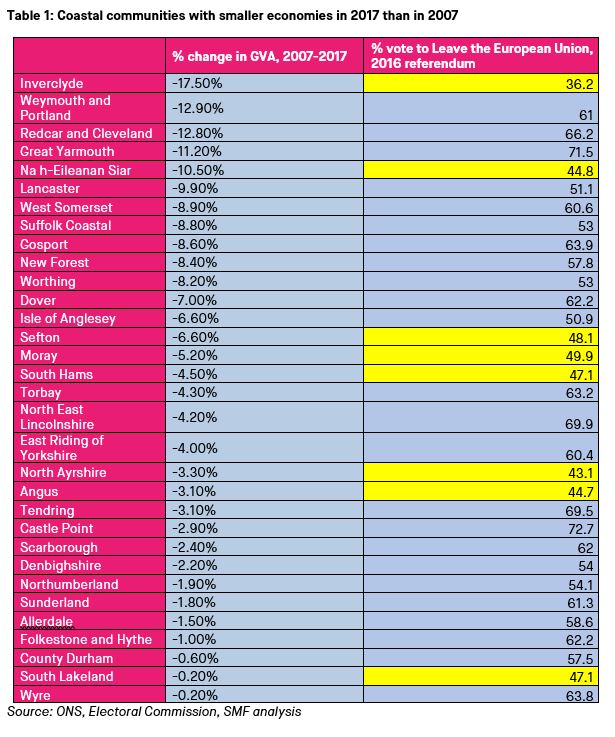Coastal communities have fallen even further behind the rest of the UK economy and workers in seaside town now earn almost £5,000 less than those elsewhere in the country, a think-tank has revealed.
More than 30 coastal areas still have economies smaller than before the financial crisis that began in 2007. Most of those places voted for Brexit.
People in coastal areas can now also expect to die earlier than those elsewhere, with the latest data showing a growing “death gap” between seaside populations and the rest of Britain.
The Social Market Foundation said the figures showed that many coastal towns have “missed out” on much of the economic growth Britain has experienced since the financial crisis and need a special package of help from Boris Johnson’s government.
In a new report entitled “Falling off a cliff?”, the SMF analysed official statistics and found that the gaps between local authority areas on the coast and the rest of the country are widening significantly.
While most of the country saw wages rise from 2017 to 2018, the SMF calculated that coastal workers suffered falling incomes.
In 2017, non-coastal workers had an average salary of £29,291. In 2018, that was £30,592. For coastal workers, the average wage was £26,098 in 2017, falling to £25,906 the following year. That means the coastal wage gap rose from £3193 to £4,686.
The SMF calculated that long-term economic decline means that many coastal towns are still poorer than they were before the 2007 financial crisis hit.
A total of 32 local authority areas with significant coastlines had smaller economies in 2017 than they did in 2007. Of those areas, 24 voted to leave the European Union.
The SMF also found that coastal areas are experiencing a decline in health relative to the rest of the country, meaning people living by the sea face shorter lives.
In the early 2000s there was no significant life expectancy gap for men born in coastal communities. But those born today can now expect to live half a year less than those in other parts of the country.
Non-coastal women have a life-expectancy at birth of 83 years, according to SMF analysis of the latest official statistics. For coastal community women, it is 82.6 years, a difference of almost five months.
Life expectancy among coastal women actually fell slightly between the 2014-16 measurement period and 2015-17.
Non-coastal men have a life expectancy of 79.3. For men who live in coastal authorities, it is 78.8.
The SMF report is the latest in a string of warnings that coastal towns are falling further and further behind as traditional employers like tourism and fishing fade and are not being replaced with newer, higher-paying work.
The think-tank called for Government to help seaside communities including tax incentives for employers in higher-paying sectors to locate in coastal areas, and new “Powerhouse” devolution deals to allow planning at a regional level.
The Government’s review of the HS2 rail project should also consider whether some of its budget would deliver greater economic benefits if it was spent improving transport connections for coastal communities. The SMF report highlighted transport challenges on the coast
Scott Corfe, SMF research director and the report’s author, said:
“Coastal areas are sadly falling further behind the rest of the country. That means people there are poorer and even die younger than people elsewhere in the UK. Gaps like that are unfair and should be addressed.
“Many coastal areas are still poorer now than they were before the financial crisis in 20007. In the context of the Brexit debate, it’s notable that most of those areas voted in favour of leaving the European Union.
“Prime Minister Boris Johnson has said he wants to help ‘forgotten’ parts of the country. Coastal areas where incomes and lifespans are falling certainly fit that description.”

Notes:
For more information or to arrange an interview, contact the SMF on scott@smf.co.uk or 020 7222 7060
About the SMF:
The Social Market Foundation (SMF) is a non-partisan think tank. We believe that fair markets, complemented by open public services, increase prosperity and help people to live well. We conduct research and run events looking at a wide range of economic and social policy areas, focusing on economic prosperity, public services and consumer markets. The SMF is resolutely independent, and the range of backgrounds and opinions among our staff, trustees and advisory board reflects this.
The SMF retains complete editorial independence of its publications.
